Summary
Although a small and isolated country on the fringe of western Europe, Ireland formed part of the metropolitan core of a global empire. While its 103 elected representatives frequently expressed their opinions on foreign affairs in the imperial parliament at Westminster, Ireland's status as an unequal partner within the United Kingdom complicated its relationship with empire. The British Empire, like other European empires, expanded rapidly during the late nineteenth century. As it developed in scale and in importance, so too did Ireland's contact with, and awareness of, this British world system.
A rather exceptionalist view of Irish interactions with empire has traditionally been taken by historians of Ireland. Until recent decades, attention focused more on Irish political opposition to empire, rather than Irish experiences of empire. However, scholarship has since provided a richer account of Ireland's contribution to empire. Studies that represented this scholarly turn towards a more complex history of Ireland and empire include: An Irish Empire? Aspects of Ireland and the British Empire, edited by Keith Jeffery and published in 1996, Ireland and the British Empire, edited by Kevin Kenny and published in 2004, and Was Ireland a Colony? Economics, Politics and Culture in Nineteenth-Century Ireland, edited by Terrence McDonough and published in 2005. These volumes, along with more recent publications, have deepened our understanding of Ireland and empire and opened up ground for historians to explore.
Discussion of Ireland in general histories of the British Empire has also tended to focus on the disruption to British political life resulting from radical Irish nationalism and its increasingly popular demand for Home Rule. For example, Britain's Imperial Century, 1815–1914, written by Ronald Hyam and published in 1993, devoted nine pages to Ireland in a section entitled ‘The Irish protest’ which concentrated on nationalist political unrest. John Darwin's The Empire Project, published in 2009, observed that Ireland was considered the ‘exposed nerve’ of domestic British and imperial politics and that the Irish nationalist demand for Home Rule was potentially ‘the starting-gun for the implosion of British world power’. Surveys of the empire have therefore encouraged a rather narrow view of the Irish as ‘enemies of the empire’ in the late nineteenth century. But Ireland in the context of British imperial history, following the Act of Union of 1800, was a paradox.
- Type
- Chapter
- Information
- Ireland and Empire in the Late Nineteenth Century , pp. ix - xiPublisher: Boydell & BrewerPrint publication year: 2023

